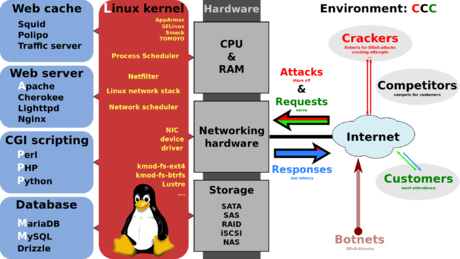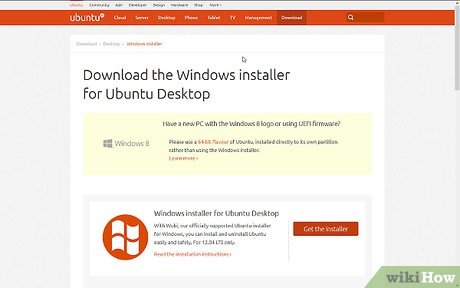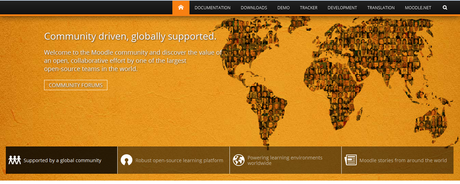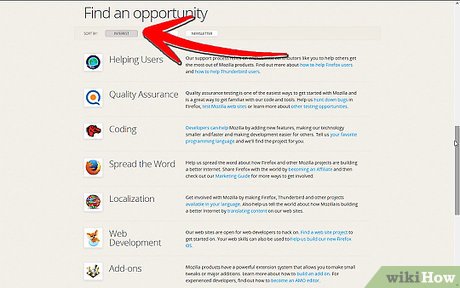How to Become an Open Source Enthusiast
Method 1 of 3:
Using Open Source Software
- Consider the amazing advantages of open source. These include more freedom, flexibility, reliability, privacy, support and more. Weigh the pros and cons of free and open source versus proprietary software.
- Most open source projects are shared freely. Office 365 Home costs around 100 dollars per year. Considering the fact that Office is very widely supported and powerful, it's not too expensive for what you're getting. The thing is, if you compare Office to something like LibreOffice, you'll find that they are fairly similar feature-wise. The one difference being that LibreOffice is free.
- Consider the extensibility of open source software. As an extension to its open nature, open source software can be modified to meet your exact needs. This can be especially useful in business environments. If you need a feature that isn't included with the package, write it yourself! While Apple products might be clean, intuitive and stable, they aren't incredibly extensible. Open source software, on the other hand, is highly extensible, and occasionally hackable to their core.
- Remember that privacy is always important. If a company states that their software is using a high level of encryption, you can't be certain that they haven't also placed security backdoors within the code to aid law enforcement or provide third parties with sensitive data. Only when the software is open source can you be absolutely sure your privacy is being upheld with the utter most care.
- Think about security. With the considerably large communities actively developing some of the major open source projects, you can rest assured that most security flaws will be weeded out quickly.
- Choose software shared under an open source license. There are millions of open source projects online. In fact, Github, a popular Git repository hosting service, passed ten million repositories back in 2013![1] There's a wide variety of open source software to choose from.[2] Using open source software comes with many advantages.
- If you're looking for an open mobile phone operating system, try Android, LineageOS (forked from CyanogenMod after being discontinued[3]), Sailfish OS or Ubuntu Touch.
- Try running an open source operating system on your laptop or desktop computer like Ubuntu, Linux Mint and Fedora instead of Windows or MacOS.
- Install the OpenOffice package or LibreOffice suite instead of Office 365. Install GIMP rather than Photoshop.
- Adopt Inkscape contrary to Adobe Illustrator.
- You can replace Chrome and Microsoft Edge by Embracing Firefox.
-
 Learn to code using open source programming languages. Start with scripting languages like Perl and Python, web development using PHP, or database management using the popular language MySQL!
Learn to code using open source programming languages. Start with scripting languages like Perl and Python, web development using PHP, or database management using the popular language MySQL! -
 Switch to an open source operating system. While Windows and MacOS are considered standard, they also fall under the category of proprietary software. Open source operating systems plant all of the advantages of open source software at the heart of your system. By using these OSes, you can rest assured that vast communities of developers are working to make it better.
Switch to an open source operating system. While Windows and MacOS are considered standard, they also fall under the category of proprietary software. Open source operating systems plant all of the advantages of open source software at the heart of your system. By using these OSes, you can rest assured that vast communities of developers are working to make it better.- Ubuntu is one of the most popular Linux distributions, making it a viable choice. Ubuntu uses the Unity interface and is based on Debian. Ubuntu is also the most widely supported. There are also plenty of derivatives of Ubuntu, such as elementaryOS and Linux Mint.
- openSUSE is another popular Linux distribution coming from Germany promoting use of Linux everywhere. This OS is a great choice for desktop users and developers.
- For more experienced users, Arch Linux is a great choice. Arch is a lightweight Linux distribution that follows a "keep it simple" philosophy, handing you a minimal system and giving you the ability to configure it to however you like.
Method 2 of 3:
Promoting Open Source Software
- Become an activist. People don't usually like change. This can really limit the spread of open source software. Try to convince your friends and family to switch. Explain why you believe it'll work better for them.
- Introduce others to open source software. Everyone uses proprietary software, and everyone knows how to use it. Getting your friends to switch can and will be difficult. Try and explain the many advantages of open source software. In the beginning, many of the people you talk to will probably be confused, since switching from something that works to something that seems foreign might not make sense at first. Switching isn't something that happens quickly. Over time, things will begin to feel more natural.
- Help others get started with free software. At first, they will probably find things difficult as open source software has a reputation of being unintuitive. If they're finding things hard, help them out. You have the power to help them coast into open source culture.
-
 Join online open source communities. Surrounding yourself with people who share the same passion about open source may be a good idea. Moodle is probably the most popular platform to get supported at, rather than other communities on Reddit and Stack Overflow.
Join online open source communities. Surrounding yourself with people who share the same passion about open source may be a good idea. Moodle is probably the most popular platform to get supported at, rather than other communities on Reddit and Stack Overflow.- Many open source projects have their own forums and online communities. As there are many choices of applications and programs in the world of open source, there you will find people with the same beliefs as you.
- Talk about open source software on social media. Share your opinions about certain open applications with your friends on Facebook and followers on Twitter. The Internet is your friend when it comes to promoting your beliefs. Try and reach out to others online and introduce them to free software.
Method 3 of 3:
Contributing to Open Source Software
- Find an open source project that you want to contribute to. There's a variety of open source projects that could use your help. You should try and find one where you would have a meaningful way of contributing. It also might be a good idea to choose one in particular that could use more volunteers.
- If you're stuck, try checking the Trending Repositories page on Github.
-
 Determine how you can help. You don't have to be a programmer to contribute to free software. Open source projects are powered by people volunteering their time and effort. There are a number of ways you could help out. If you have something to offer, your work will almost always be welcomed.
Determine how you can help. You don't have to be a programmer to contribute to free software. Open source projects are powered by people volunteering their time and effort. There are a number of ways you could help out. If you have something to offer, your work will almost always be welcomed. - Offer feedback on the project. Free software, just like any form of software, thrives on feedback. Without it, the project could be pulled away from the interest of the user. Tell developers what you like and don't like about their software. If you're offering critical feedback, provide them with a way to make it better. Try and request features you think would improve the software as well.
- Contribute your time as a developer. Contributing code is probably the best way to contribute to an open source project. If you are familiar with the language used to write the software you're interested in, try forking the program, make your modifications and open a pull request.
- Try translating the user interface or documentation into another language. Have you found an open source project that hasn't yet or is in the process of being translated into your first language or another language you know? Translating is a great way to contribute to a project without doing any programming.
- Answer user questions. People will always have questions, and someone will always need to be there to answer them. Try taking up this role and help confused users. If these users don't find solutions to their problems, they could find themselves discouraged. Stack Exchange is a great place to start. With its vast network of questions-and-answers websites, you will almost certainly find people in need of help.
- Most open source projects also have dedicated forums where users can ask questions and get answers. There, you will find more people asking questions specific to what you're skilled with.
- Become an activist. Promoting the open source project you're interested in is a simple but effective way to push it forward. Share your opinion on social media and help spread the word.
- Donate. The majority of open source projects are funded by donations. Without them, finding money would be particularly more difficult. Donating is an easy and great way of supporting your favorite project.
Share by
Marvin Fry
Update 05 March 2020



